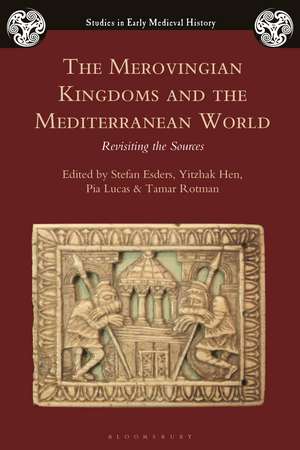The Merovingian Kingdoms and the Mediterranean World: Revisiting the Sources: Studies in Early Medieval History
Editat de Stefan Esders, Yitzhak Hen, Pia Lucas, Tamar Rotmanen Limba Engleză Paperback – 23 mar 2022
| Toate formatele și edițiile | Preț | Express |
|---|---|---|
| Paperback (1) | 192.30 lei 43-57 zile | |
| Bloomsbury Publishing – 23 mar 2022 | 192.30 lei 43-57 zile | |
| Hardback (1) | 658.11 lei 43-57 zile | |
| Bloomsbury Publishing – mai 2019 | 658.11 lei 43-57 zile |
Preț: 192.30 lei
Preț vechi: 249.87 lei
-23% Nou
Puncte Express: 288
Preț estimativ în valută:
36.80€ • 38.52$ • 30.63£
36.80€ • 38.52$ • 30.63£
Carte tipărită la comandă
Livrare economică 31 martie-14 aprilie
Preluare comenzi: 021 569.72.76
Specificații
ISBN-13: 9781526629685
ISBN-10: 1526629682
Pagini: 274
Ilustrații: 2 bw illus
Dimensiuni: 156 x 234 x 20 mm
Greutate: 0.39 kg
Editura: Bloomsbury Publishing
Colecția Bloomsbury Academic
Seria Studies in Early Medieval History
Locul publicării:London, United Kingdom
ISBN-10: 1526629682
Pagini: 274
Ilustrații: 2 bw illus
Dimensiuni: 156 x 234 x 20 mm
Greutate: 0.39 kg
Editura: Bloomsbury Publishing
Colecția Bloomsbury Academic
Seria Studies in Early Medieval History
Locul publicării:London, United Kingdom
Caracteristici
Examines a wide range of sources, including historiography, hagiography, law codes, church council acts, geography and letters
Notă biografică
Stefan Esders is Professor of History of Late Antiquity and the Early Middle Ages at the Friedrich-Meinecke-Institut, Freie Universität Berlin, Germany.Yitzhak Hen is Professor of Late Antique and Early Medieval History, Department of History at The Hebrew University of Jerusalem and the Director of the Israel Institute for Advanced Studies, Israel.Pia Lucas is a doctoral candidate and research assistant at the Friedrich-Meinecke-Institut, Freie Universität Berlin, Germany.Tamar Rotman is a post-doctoral fellow in the Department of General History at Bar Ilan University and a research assistant in the Israeli Science Foundation project "Through distant eyes: the birth of a Merovingian story, 575-1575", Israel.
Cuprins
AcknowledgementsList of ContributorsList of AbbreviationsMaps Introduction, Pia Lucas and Tamar Rotman Part 1: The wider world: Setting the context of the post-Roman world1. History, geography and the notion of mare nostrum in the early medieval WestYitzhak Hen 2. True differences: Gregory of Tours' account of the Council of Mâcon (585)Helmut Reimitz Part 2: Mediterranean ties and Merovingian diplomacy3. East and West from a Visigothic perspective: How and why were Frankish brides negotiated in the late sixth century Anna Gehler-Rachunek 4. Friendship and diplomacy in the Histories of Gregory of ToursHope Williard 5. Private records of official diplomacy: The Franco-Byzantine letters in the Austrasian Epistolar CollectionBruno Dumezil 6. The language of sixth-century Frankish diplomacyYaniv Fox Part 3: Bridging the Seas: Law and religion 7. Mediterranean Homesick Blues: Human trafficking in the Merovingian legesLukas Bothe 8. The Fifth Council of Orléans and the reception of the Three Chapters controversy in Merovingian GaulTill Stüber 9. Reconciling disturbed sacred space: The ordo for "reconciling an altar where a murder has been committed" in the Sacramentary of Gellone in its cultural context.Rob Meens 10. Imitation and rejection of Eastern practices in Merovingian Gaul: Gregory of Tours and Vulfilaic the Stylite of TrierTamar Rotman Part 4: Shifting Perspectives: Emperors, tributes and propaganda11. Magnus et verus christianus: The portrayal of Emperor Tiberius II in Gregory of ToursPia Lucas 12. When contemporary history is caught up by the immediate present: Fredegar's proleptic depiction of Emperor Constans II Stefan Esders 13. Byzantium, the Merovingians, and the hog: A passage of Theophanes' Chronicle revisitedFederico Montinaro Conclusion, Yitzhak Hen and Stefan Esders Index
Recenzii
[This] is an engaging and impressive collection. The essays are filled with sharp insights and an eager willingness to upend traditional interpretations that makes the reading enjoyable without weakening their scholarly gravitas.
The two absorbing volumes ... provide timely foundations for more integrated studies of the Merovingian Franks within a much broader cultural context ... provides a sound and much-needed first step, and these interventions bode well for the future of early medieval studies.
The two absorbing volumes ... provide timely foundations for more integrated studies of the Merovingian Franks within a much broader cultural context ... provides a sound and much-needed first step, and these interventions bode well for the future of early medieval studies.








